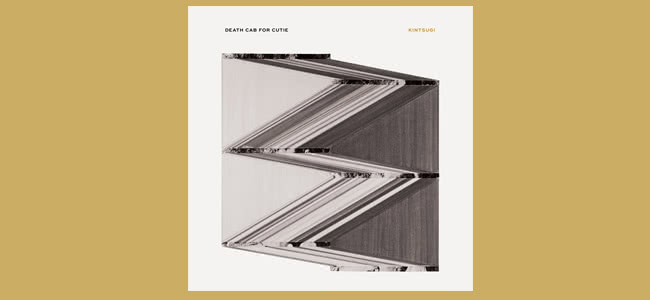As a band orbits closer to the 20-year mark, they’re often faced with a very difficult question: to recycle or to reinvent? Sure, there are plenty of arguments in favour of both options but more often than not, this situation is a two-sided trap. If they choose to recycle the sound of their golden years they’re accused of being unimaginative or dried up. Yet if they choose the path of reinvention, they run the risk of alienating their fan base.
On their eighth studio album Kintsugi – and their first since the departure of guitarist and producer, Chris Walla – Death Cab For Cutie have chosen the path of reinvention. Whilst this record is still framed around their classic combination of ruminative ballads and inoffensive bangers, they’ve expanded their horizons sonically – incorporating elements of electronic, post-rock and post-punk into their indie-rock palette.
It may not be quite as immediate or as angst-driven as the likes of We Have The Facts and We’re Voting Yes or as daring as Radiohead’s Kid A, but Kintsugi is a solid record that showcases maturity and progression whilst still offering up a few curveballs. 18 years down the track, that’s probably the best we could ask for.
So without further ado, here are a few things we learned from Kintsugi.
Death Cab For Cutie Are No Longer Just An ‘Indie Rock’ Band
Whilst Death Cab have been experimenting with electronic sounds since 2005’s Plans, until now these ideas were yet to be fully realised across an entire album.
Whilst this record does still contain the usual dosage of slow, ruminative guitar riffs and aching acoustic guitars, new elements such as electronic drums, atmospheric synths and 80s-inspired guitar licks are also scattered around the place.
Mid-album number ‘You’ve Haunted Me All My Life’ features a faint drumbeat that eerily resembles the rhythm of a heartbeat, ‘Everything’s A Ceiling’ – with its cheesy synth line and U2-inspired guitar motifs – sounds like a long-lost anthem from the 1980s whilst ‘Good Help (Is So Hard To Find)’ sees the band try their hand at syncopation with surprisingly positive results.
Lyrics Are No Longer Ben Gibbard’s Strong Point
Back in the early 2000s, nobody penned the trials and tribulations of adolescence better than Death Cab. From romantic longing to self-loathing, Ben Gibbard always seemed to find a clever, succinct and affecting way to capture these woes.
On Kintsugi however, Gibbard’s lyrics operate not as an emotional amplifier but as an awkward device that often detracts from the emotive nature of these arrangements. Tracks like ‘Little Wanderer’ and ‘Binary Sea’ are marred by unimaginative clichés (e.g. “you’re my wanderer, little wanderer / won’t you wander back to me?”), which unfortunately do not grow more affecting with each repetition.
Meanwhile the belligerent guitar work of “Black Sun” packs a powerful punch, but lines like “how could something so fair be so cruel” resemble the ineloquent utterances of a teenager and unfortunately, fail to hit any targets.
Death Cab Don’t Have To Be Depressing To Be Good
[include_post id=”441168″]Whilst Death Cab were once strongly aligned with the likes of Bright Eyes and others acts that intend to make their listeners weep endlessly – the strongest tracks on this record occur when they decide to up the tempo and the serotonin levels.
Driven by a razor sharp guitar riff, ‘The Ghosts Of Beverley Drive’ is a moody toe-tapper that calls to mind The Cure’s ‘A Forest’ with its chorus-drenched guitar work, ricocheting percussion and dark ambiance. Meanwhile, latecomer ‘El Dorado’ weaves a trance-like drum rhythm with a springing guitar melody, resulting in a rare moment of propulsion on an album that tends to drag its feet a little.
A Band Can Lose A Founding Member And Still Prosper
Whilst some bands splutter and cough after losing a founding member, Kintsugi proves that Death Cab is still a strong force without the assistance of Chris Walla.
Whilst Walla’s absence is noticeable both in the guitar work and the production aesthetic, Gibbard and co. do not attempt to disguise this, but instead push their music into a new direction with mostly positive results.
Opening number ‘No Room In Frame’ begins with ambient sounds that one could easily mistake for Sigur Ros whilst ‘Ingenue’ loops vocal samples over a Radiohead-esque drum pattern resulting in a rather intricate tune. Whilst it is upsetting to see Walla go, it’s nice to see Death Cab explore new territory in the wake of this loss.
Here’s hoping they continue to explore these atmospheric inclinations on future releases.
Kintsugi is out this Friday the 27th via Warner – pre order at www.deathcabforcutie.com



































